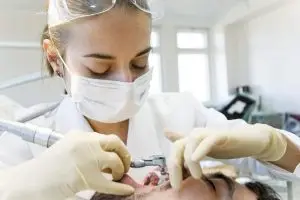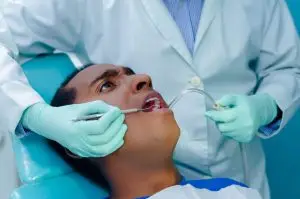If you think dental sedation is only available for people who need invasive dental surgery or for patients too terrified to go to the dentist, think again. Yes, it can be used for that, but there are multiple situations where sedation is the best option to help someone through a dental procedure.
Your dentist wants you to receive good dental care and to help you maintain good dental health. If dental sedation will help you sit through a procedure or make you more willing to set the appointment, then it’s something to consider. If you fall into any of these categories, talk to your dentist about your sedation options.
Deal with Anxiety or Fear
 Dental sedation is an excellent option if going to the dentist or some part of the procedure fills you with fear or anxiety. Oral sedation helps reduce your anxiety and puts you in a deep state of relaxation. Your fear has less control over your emotions or your ability to sit through your procedure — whether it’s a basic cleaning or something more invasive.
Dental sedation is an excellent option if going to the dentist or some part of the procedure fills you with fear or anxiety. Oral sedation helps reduce your anxiety and puts you in a deep state of relaxation. Your fear has less control over your emotions or your ability to sit through your procedure — whether it’s a basic cleaning or something more invasive.
Reduce Discomfort
While anxiety makes you uncomfortable, there are other forms of discomfort that dental sedation can reduce, as well. You may be worried about feeling pain or have a low tolerance for even minor pain levels of pain. You may not think you can “handle” the procedure, even though you’re not necessarily afraid or anxious. Sedation helps you relax and minimizes pain that a local anesthetic doesn’t mask.
Help Overly Sensitive Mouths
 We don’t mean that you’re prone to tears, although dental sedation can likely help with that, too. Some patients have sensitive mouths. Dental instruments trigger their gag reflex. The feeling of anything on their teeth hurts, thanks to sensitive teeth, causing them to close their mouth at the wrong time. If this is a problem for you, dental sedation can help you relax so deeply that you’re barely aware of what’s going on around you, let alone what bothers your teeth.
We don’t mean that you’re prone to tears, although dental sedation can likely help with that, too. Some patients have sensitive mouths. Dental instruments trigger their gag reflex. The feeling of anything on their teeth hurts, thanks to sensitive teeth, causing them to close their mouth at the wrong time. If this is a problem for you, dental sedation can help you relax so deeply that you’re barely aware of what’s going on around you, let alone what bothers your teeth.
Shorten Long Dental Procedures
Even if you’re not afraid or don’t have a strong gag reflex, dental sedation might still be a good option for you. Why? Because your procedure is very long, and it’s not always easy to sit in the chair the entire time. What may normally occur over several shorter procedures — with multiple appointments — can be reduced with the help of sedation. Because you’re relaxed, you’re able to stay in the chair longer and let the dentist do more work. Five visits may be two or three, and two or three may become a single appointment.
Help Uncontrollable Movements
 Dental sedation can be a big help for patients with certain chronic conditions or diseases that cause uncontrollable movement like Parkinson’s disease and Cerebral Palsy. Patients with these conditions are physically unable to sit still and hold their body still, no matter how much they want to. Sedation can help reduce or temporarily eliminate these movements so the dentist can perform the procedure.
Dental sedation can be a big help for patients with certain chronic conditions or diseases that cause uncontrollable movement like Parkinson’s disease and Cerebral Palsy. Patients with these conditions are physically unable to sit still and hold their body still, no matter how much they want to. Sedation can help reduce or temporarily eliminate these movements so the dentist can perform the procedure.
Sit Still Longer
Even if your procedure isn’t a long one, some people struggle with sitting still. They fidget or need to get up. Dental sedation helps you stay calm and sit still longer than you normally would. This decreases the amount of time your dentist visit will take. Instead of getting up every so often or accidentally bumping the dentist when you fidget, you’ll still quietly and calmly.
Time Passes More Quickly
 This may not be a reason to ask for dental sedation, but it is a happy side effect. Even basic dental exams can feel like they take forever. During sedation, time seems to speed by. Why? Because you’re so relaxed, you’re not worried about the time, what’s happening next, or what you need to do later. You can zone out and let your dentist work.
This may not be a reason to ask for dental sedation, but it is a happy side effect. Even basic dental exams can feel like they take forever. During sedation, time seems to speed by. Why? Because you’re so relaxed, you’re not worried about the time, what’s happening next, or what you need to do later. You can zone out and let your dentist work.
Conclusion
If you fall into any of the categories listed above, talk to your dentist in Mesa about what dental sedation options are available for you. You may only need a bit of nitrous oxide during your procedure or an oral sedation may be a better option. What will work best depends on your needs, your medical history, and the type of procedure your dentist needs to perform. But getting the help you need for your dental care starts with asking about dental sedation.
